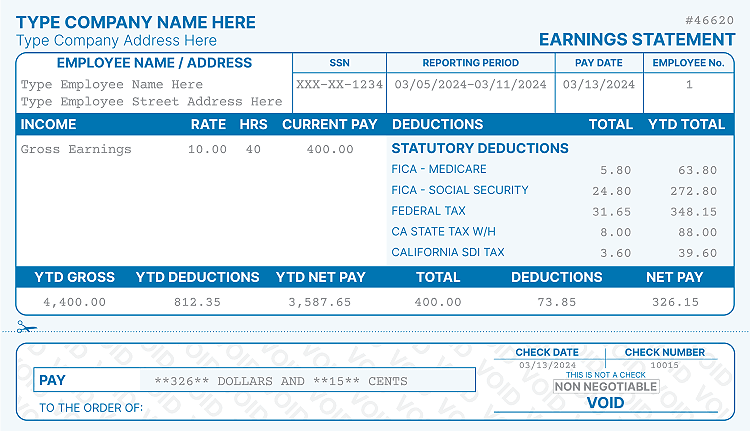How To Spot Errors On Your Paystub And What To Do About Them?

An organization's smooth payroll process is critical to ensuring a thriving business. A smooth process is like oxygen, where you don't notice its presence, but its absence will affect all stakeholders. It's the least appreciated yet most crucial function in an organization.
You must ensure the payroll is sent out adequately to keep employees satisfied and the organization safe from legal consequences. Otherwise, the impact of payroll errors can cause a ripple across the organization.
This begs the question of what does a smooth payroll process entail? Effective payroll management can be put in place by making sure your employees receive correct payments on time and in compliance with applicable laws. With the right tools and resources, payroll can become a minefield for errors that can save employees and the company time and money.
The company should put every measure in place to ensure no errors occur. However, if you're an employee working at a firm, you may inadvertently overlook such errors. Let's talk about how to spot a payroll mistake on your pay stub and what you should do about them.
Spot your paystub
Your pay stub is only sometimes visible, but there's no need to fret because there are multiple ways you can acquire the pay stub if it's not directly provided to you.
The first step is to locate your pay stub on your paycheck. If you receive a paper paycheck, you will typically find it attached to a pay stub that you rip off at a perforation. This is the case even when your pay is directly deposited in your account. You will get a paper pay stub as a receipt for the payment, either mailed or handed to you.
Another option that may be available is viewing your pay stub on your company's payroll online interface. Furthermore, if you live in a state where an employer isn't required to provide a pay stub, try asking your payroll department for the records they're required to keep about your pay.
Examine gross and net pay amounts
Examining every little detail in your paycheck without leaving any stone unturned is always advised. This includes understanding the gross and net pay amount of your pay. Whether you're paid at an hourly rate or paid a salary, always look at the gross amount. The gross amount means the amount of payment before taxes and other withholding or deductions are applied.
For instance, health insurance and union dues are taken from the salary before the amount is delivered to your bank account. It's important to note that if your employer pays you hourly and your hours vary, the gross amount you earn each pay period will also vary. As a salary or hourly worker with a set schedule, your gross pay tends to be the same for each pay period.
Net pay is the net income or take-home pay since it's the money you get to take home once taxes and other amounts are deducted from the gross pay.
In terms of net payments, as long as you've been equating wages with the amount you earn, you might be disappointed because net pay ends up significantly less than gross pay.
Miscalculated pay amount
When an employee receives a paycheck with errors that result in missed payments, it can be frustrating for everyone involved. Miscalculations are a waste of time because dedicating more hours to investigating payroll errors can be tedious when you could have utilized that time for doing something productive instead.
Miscalculations can occur with salaried as well as hourly employees. Still, it's a good idea to try to avoid any because a miscalculated paycheck will make employees grow frustrated, and they might even struggle with paying their bills.
If you encounter this issue, it's a good idea first to establish the pay discrepancy and over what period. Contact your manager or HR immediately after you spot the error because the longer you wait, the more likely you will compound the problem.
In another case, when a mistake occurs in your favor, you're still obligated to speak up about it because an employer is legally entitled to claw that money back.
Examine hours and rate.
The rate per hour section will be left blank for a salaried employee. However, if you're being paid hourly, the number of hours you worked in the pay period and the hourly rate should be listed on your pay stub.
Keep track of your hours in each pay period while comparing it to your pay stub. This helps you ensure all your work hours are compensated at the pay rate you're entitled to.
Additionally, you may have earned overtime wages if you worked more than 40 hours a week. You must verify that you're being paid correctly at the correct rate.
Check federal withholdings
Federal withholdings will display exactly what taxes you're paying to the federal government that is withheld from your gross pay. These withholdings or documents will typically be labeled as "FED," "FIT," or "FITW."
To help you reduce financial stress, there's a method you can implement to change the way you pay your taxes. You can change the amount withheld from each paycheck by changing the number of dependents you claim.
However, remember that if you do not have enough taxes withheld from your paycheck, you will owe the IRS when you file your taxes. This method may seem risky, but it will ultimately reduce financial stress, making it a suitable opportunity.
Conversely, if you have a high amount withheld, you are entitled to a refund from the IRS when you file your taxes. This is not great because it means you're missing out on the interest or investment returns that money could have provided throughout the year.
Regardless of your approach, pay attention to the amount of taxes being withheld and confirm that it is correct.
Bottom Line
Before anything, know where to find your pay stub. You may receive it in the form of paper, or you can view it on your company's payroll online interface. If something else is the case, try asking your payroll department for the records required to keep about your pay.
Next, you examine your gross amount, the income before deductions and other withholdings, and your net amount, the money you get to take home. When a payment is miscalculated, establish the pay discrepancy and take this issue immediately to HR to get help resolving it. Use the same approach if the pay miscalculation acts in your favor to avoid future problems.
You should also examine the hourly pay rate to ensure you're compensated correctly. Compare both the hours you work and the rate of hourly pay listed. Finally, always confirm the amount of taxes deducted. If you do not have enough taxes withheld from your paycheck, you will owe the IRS when you file your taxes.
Remember, you're always careful when ensuring you're paid fairly and adequately. We hope this article provides insightful information for you.

